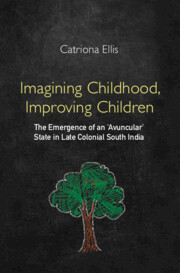 Imagining Childhood, Improving Children
Imagining Childhood, Improving Children Book contents
- Frontmatter
- Dedication
- Contents
- Acknowledgements
- List of Abbreviations
- Introduction
- 1 The Child at School: Compulsory Education in the Madras Presidency
- 2 Educating the Child: The Introduction of Compulsory Education in Madras City
- 3 Imagining the Child as Learner: Progressive Pedagogy in the Madras Presidency
- 4 Producing the Healthy Schoolchild
- 5 Saving the Child: The Madras Children Act, 1920, and the Beginnings of a Juvenile Justice System
- 6 Protecting the Poor Child: The Practical Expansion of Juvenile Justice
- 7 Defining Childhood: Sexual Parameters of Childhood
- 8 Remembering Childhoods: Childhood Memories in Autobiographies
- Conclusion: Children, Childhood and the Growth of the Avuncular State in South India
- Notes
- Bibliography
- Index
8 - Remembering Childhoods: Childhood Memories in Autobiographies
Published online by Cambridge University Press: 19 April 2023
- Frontmatter
- Dedication
- Contents
- Acknowledgements
- List of Abbreviations
- Introduction
- 1 The Child at School: Compulsory Education in the Madras Presidency
- 2 Educating the Child: The Introduction of Compulsory Education in Madras City
- 3 Imagining the Child as Learner: Progressive Pedagogy in the Madras Presidency
- 4 Producing the Healthy Schoolchild
- 5 Saving the Child: The Madras Children Act, 1920, and the Beginnings of a Juvenile Justice System
- 6 Protecting the Poor Child: The Practical Expansion of Juvenile Justice
- 7 Defining Childhood: Sexual Parameters of Childhood
- 8 Remembering Childhoods: Childhood Memories in Autobiographies
- Conclusion: Children, Childhood and the Growth of the Avuncular State in South India
- Notes
- Bibliography
- Index
Summary
This chapter sits juxtaposed with the rest of the book by considering a number of its recurring themes through an entirely different and more personal archival material—the autobiographical memories of adults who were children during the 1920s, 1930s and 1940s. By considering the embodied actions and memories of children, the chapter foregrounds children as historical actors and claims that historians need to not only consider adult-led initiatives to improve children's lives or regulate their identities and behaviours but to consider the complex, uneven and gradual ways in which ideas about childhood, the state and the community evolved in social practice and in the everyday. This deepens our understanding of the difference between the realities of social relationships on the ground as opposed to the ways that the lives of poor children were imagined by the avuncular elite.
A close reading of a wide range of autobiographies provides an opportunity to reflect on the impact of new modern views about childhood and the child as an individual, rights-bearing future citizen. The memoirs offer an alternative lens through which to analyse new modern practices of governmentality, the introduction of modern educational structures and to assess the relationship between new forms of knowledge transmission in the school and existing authority and knowledge structures within the home, workplace and community. This in turns helps us to interrogate further the contested ways in which new identities were formed and old ones were reformulated. In particular, the chapter begins to uncover how children negotiated their emerging individual selfhood alongside their allegiance to their peers, and their attempts to find personal meaning in identities that adult society imposed on them, particularly caste and gender. Autobiographies, as more intimate sources than those used in the previous chapters, also allow us some small, fragmentary insights into the affective and educational relationships within the family, considering how kinship relations functioned in practice rather than how they were assumed to function in state and civil society discourse. These perspectives were intrinsically linked to the author's choice of life writing as a genre. How these adult writers sought to represent their own childhoods and relationships was closely connected to their political commitment to the ideas of universal childhood and individual agency as a basis for progress and nation-building.
- Type
- Chapter
- Information
- Imagining Childhood, Improving ChildrenThe Emergence of an ‘Avuncular’ State in Late Colonial South India, pp. 205 - 229Publisher: Cambridge University PressPrint publication year: 2023


